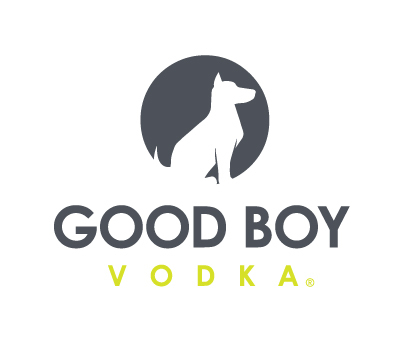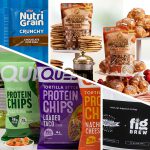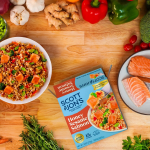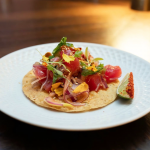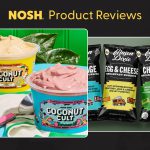Smart Cookie: Levain Bakery Moves into CPG
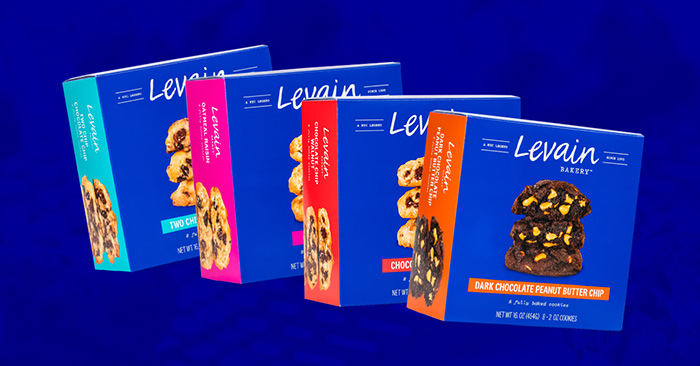
Opened 25 years ago by Connie McDonald and Pam Weekes, in 2018 The Stripes Group acquired the majority of Levain — which has been singled out for having chocolate chip cookies that are among the best in New York. Soon after, Andy Taylor was brought on as CEO, and CPG vets, including CMO Rachel Porges and CFO Jennifer Dong, were also hired. The company has 7 bakeries, along with a robust ecommerce business. Although the bakeries each stock roughly 30 to 40 SKUs, the bulk of their business remains in cookies, Taylor said.
In CPG, the Levain team decided to stick with what was working, launching 8-packs of frozen, precooked cookies which will retail for $7.99 to $9.99. Unlike the bakery’s colossal 6 oz. cookies, the frozen cookies are 2 oz. each, more of an “everyday indulgence,” Porges said. Available in Chocolate Chip Walnut, Oatmeal Raisin, Two Chip Chocolate Chip and Dark Chocolate Peanut Butter Chip, the cookies can either be defrosted and eaten or, as Levain suggests, heated for a few minutes.
Texas retailer Central Market was the first to pick up the new line, which will soon also be sold in the Whole Foods Northeast region. It’s a project that has been in development for 18 months, Taylor said, and was a core element of the Stripes investment.
“[The founders] always knew there was something out there for them and it was just about the funding, the people and the resources to do it all,” Porges said. “It was a matter of determining how to do CPG in a way that was really true to the brand and told the brand story in a way that we wanted it to be told — because for most people who experience our CPG product, this might be their first and only experience with Levain Bakery.”
The cookies Levain sells are unique, with a slew of inclusions resulting in gooey centers. The desire to have full control over the product experience eventually led the team away from more traditional cookie products such as refrigerated or frozen dough, which they were concerned wouldn’t always yield the signature soft center. Similarly, shelf stable cookies were deemed too hard or crumbly.
“You get that delicious fresh baked experience but we’ve taken a lot of the friction out of the process,” Porges said. “You don’t have to have ingredients, you don’t have to get your hands dirty, you don’t even have to really worry about raw dough.”
A dedicated grocery sales resource will begin at the end of the month. The plan is to roll out in stores “semi-regionally,” she said, moving from the East coast slowly across the country. Regions where the company already has brand awareness will be the first to see the new line as it’s “just more efficient” in terms of marketing spend, she said. While the line commands a more premium price point then your average Tollhouse cookie, Porges said, the plan is not to focus solely on specialty retailers, with conventional, mass and natural stores all playing a role.
“Levain Bakery has proven to be a brand that over the last 25 years attracts a broad swath of consumers,” Porges said. “If you stand in the bakery on a weekend, you’ve got everyone coming to the door… and that’s completely what we’re anticipating with the frozen product.”
Once the brand has firmly established itself in grocery, other launches may be forthcoming. Levain’s other products include cakes, sticky buns, breads and other pastries. First up, however, the company is considering launching a gluten-free cookie, which it already sells in the bakeries (though is not baked in a gluten-free environment in stores).
Along with CPG, the company also will focus on its ecommerce business, which is typically used by consumers for gifting occasions, Taylor said. Over the next three year, he added, the hope is to grow the CPG line to 18-20% of the business and maintain ecommerce as roughly 10-15% of sales.
“Certainly [we were] always about diversification and going into areas where we thought we could do well,” Taylor said. “But obviously with Covid and the new world, diversification, and diversification of risk in particular, is even more important.”












